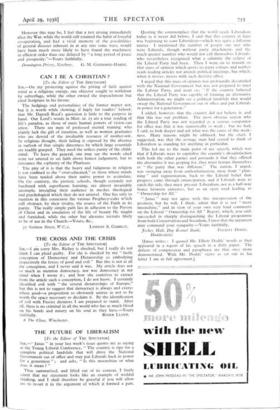THE FUTURE OF LIBERALISM [To the Editor of THE SPECTATOR]
Sat,—" Janus" in your last week's issue quotes me as saying at the Young Liberal Conference, "The country is ripe for a complete political landslide that will drive the National Government out of office and may put Liberals back in power for a generation " ; and asks, "Is this moonshine or what does it mean ? "
Thus summarised, and lifted out of its context, I freely admit that my statement looks like an example of wishful thinking, and I shall therefore be grateful if you will allow me to re-set it in the argument of which it formed a part.
Quoting the commonplace that the world needs Liberalism today as it never did before, I said that this country at least was beginning to want Liberalism—which was quite a different matter. I mentioned the number of people one met who were Liberals, though without party attachment, and the much greater number who would not call themselves Liberals, who nevertheless recognised what a calamity the eclipse of the Liberal Party had been. Then I went on to remark on that mass of opinion which sports no party colours and neither reads leading articles nor attends political meetings, but which, when it moves, moves with such decisive effect.
I urged that this mass of opinion was profoundly dissatisfied with the National Government but was not prepared to trust the Labour Party, and went on, "If the country believed that the Liberal Party was capable of forming an alternative Administration, we might see a political landslide that would sweep the National Government out of office and put Liberals in power for a generation."
I added, however, that the country did not believe it, and that this was our problem. The most obvious reason why the Liberal Party was not regarded as a serious competitor for office was that it was numerically so weak ; but we had, I said, to look deeper and ask what was the cause of this weak- ness. Many reasons might be adduced, but the chief, I suggested, was that the average man had ceased to think of Liberalism as standing for anything in particular.
This led me to the main point of my speech, which was that if Liberals were to capitalise the country's dissatisfaction with both the other parties and persuade it that they offered the alternative it was groping for, they must feature themselves as "the party that was different." The nation, I urged, was swinging away from authoritarianism, away from " plan- ning " and regimentation, back to the Liberal belief that progress came through emancipation, and if Liberals were to catch this tide, they must present Liberalism, not as a half-way house between extremes, but as an open road leading to "Ownership for All.-
" Janus " may not agree with this interpretation of the position, but he will, I think, admit that it is not "mere moonshine," and in view of your own very kind comments on the Liberal "Ownership for All" Report, which, you said, succeeded in sharply distinguishing the Liberal programme from both Conservatism and Socialism, I trust that the argument may command your sympathy.—Yours faithfully,
Jockey Hall, Dog Kennel Bank, ELLIOTT DODDS. Huddersfield.
[Janus writes : I quoted Mr. Elliott Dodds' words as they appeared in a report of his speech in a daily paper. The defects of compression and paraphrase are thus once more demonstrated. With Mr. Dodds' views as set out in his letter I am in full agreement.]


























































 Previous page
Previous page